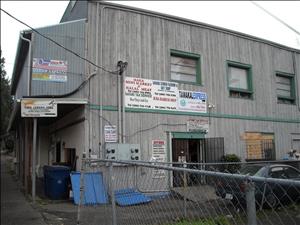On November 7, 2001, the FBI raids the Maka Mini Mart and Halal Meats and the businesses sharing its space as part of an investigation into one of those businesses, Barakat Wire Transfer Service. The business is located in the Rainier Valley in Seattle. The raid occurs just two months after the terrorist attacks of September 11, 2001. There are concerns that the Somali market and wire transfer service are targeted because of their owners' Muslim religion. After several months the FBI drops the investigation and two of the businesses receive partial compensation for confiscated goods and losses suffered due to closure.
Background of the Raid
President George W. Bush signed Executive Order 13224 on September 25, 2001. The order authorized the Treasury Department to freeze the assets and seize the property of people suspected of financially supporting terrorism.
This action was one of the strategies developed by the Bush administration to combat al-Qaida, which had carried out the coordinated terrorist attacks on the United States on September 11, 2001. According to President Bush, freezing the financial assets, "disrupts al-Qaida's communications, blocks an important source of funds, obtains valuable information, and sends a clear message to global financial institutions: You are with us, or with the terrorists. And if you are with the terrorists, you will face the consequences" ("Fact Sheet").
Raiding a Seattle Somali Market
On November 7, at 7:30 in the morning, federal agents raided the Maka Mini Market at S Brandon Street and Rainier Avenue S in the Rainier Valley. Maka Mini Market's owner, Abdinasir Ali Nur, leased space to Barakat Wire Transfer Company and Amana Gift Market. The federal agents came primarily to seize Barakat's property, but also, according to a Seattle Times article, to look into possible food stamp fraud and khat sales out of the building. Khat (Catha edulis), illegal in the United States, is a leaf that causes a mild euphoric effect when it is chewed. These last two accusations do not appear in any later newspaper articles about the raids and the stores are never charged with those crimes.
The government accused Barakat Wire Transfer Company of aiding terrorism because its parent company, al-Barakaat, in Dubai, United Arab Emirates, allegedly diverted a portion of its proceeds from transactions to al-Qaida. It did not suspect Barakat's owner, Hassan Farah, or any of its customers of knowingly participated in the diversion of funds.
Maka Mini Mart and the other businesses remained closed for most of November. The raid and closure proved especially traumatic for the Somali community. They had fled from a country with a history of government-sponsored violence and, although this incident did not result in any bloodshed, it was a grim reminder of what the government might do. Some Somalis also worried that the raids would reflect badly upon the community, especially in light of the difficulty some people had differentiating between Muslims and al-Qaida terrorists.
Sending Money Home
Two days after the raid, some Somali immigrants and other Seattle residents protested the closures with a march followed by a rally in front of the Immigration and Naturalization Service office. The march started at Maka Mini Mart, moved north on Rainier Avenue S, turned west on Dearborn Street, and ended at the INS office on Airport Way S. The Seattle Post-Intelligencer reported that one of the protester's signs read, ""I will continue to send money to my father and children in Somalia. This is not an act of terrorism" (Skolnik and Sunde, "Somalis Protest U.S. Raid, Store's Closure").
The sign referred the reason so many Somali immigrants used Barakat Wire Transfer Company. It was a hawala, which means it utilized an informal system to disburse money to individuals in Somalia or in refugee camps. In the camps, the company's agent would receive a monetary transfer along with a list of intended recipients. A runner would then go to individual clans' elders to find the recipients and give them the transferred funds.
If a Somali immigrant used a service like Western Union, the recipients would face insurmountable obstacles to getting the money. First, American-based companies require identification and an address to receive funds from their services, both of which are difficult to obtain in a refugee camp. Second, the the American-based companies usually establish offices in larger cities only, not in rural areas and not in refugee camps.
Community Support
Seattle residents who were not Somali immigrants also stepped forward to support the store owners. They joined protests and offered monetary support. The Church Council of Greater Seattle gathered donations and notes of encouragement into a $10,000 fund that it gave to Nur and Abdinasir Khalif Farah, owner of Amana Gift Market, to help with reopening their businesses.
On December 19, 2001, the American Civil Liberties Union filed a suit on behalf of Nur and Abdinasi Khalif Farah for compensation for the goods and equipment the government had confiscated and for the time their stores were closed. The government agreed to pay $100,000 as compensation for the losses they sustained as a result of the raids. The charges were eventually dropped against Barakat Wire Transfer Company, but this firm never reopened.
Living Our Lives in Peace
A statement released by the American Civil Liberties Union included a statement by Nur and Abdinasi Khalif Farah: "We want to express our appreciation to all the people who have helped us -- the customers who kept shopping in our markets, the churches and other organizations that offered their support, and the people we had never met who came by to wish us well. We look forward to continuing to serve the Somali community and others in Seattle.
"And we look forward to living our lives in peace" ("Somali Merchants in Seattle").

